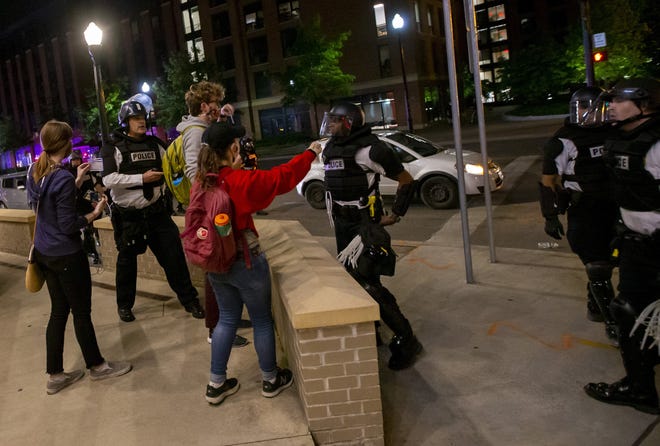Published first in the AEJMC Media Ethics Division newsletter
Our student-journalists at Ohio State started the 2019 Ohio State fall semester covering a campus-area shooting, and we thought that was a crazy way to kick off the year.
If only we knew what was coming.
This year we were barely out of the 2019-2020 school year when the 2020-2021 editorial team we started covering protests around the death of George Floyd. As the calendar turned to June, they were pepper-sprayed by police and protest coverage continued through July.
By August we kicked off our academic year embroiled in mandatory coronavirus testing and the Big Ten’s cancelation of the fall sports season. By September a public safety notice that revealed a verbal and physical attack by Black suspects on white student was a hate crime led to more campus protests, and our student-journalists were criticized for refusing to blur protestor faces.
October has brought presidential debates and the promise of political turmoil through the November election and beyond.
Oh, and did I mention their ongoing and never-ending COVID-19 coverage?
They are already tired, and we are barely halfway through our 2020 fall semester.
I’d love to say that this incredible journalistic pace is a product of this crazy year that seems never-ending, but I believe this is the new normal of student-journalist from now on.
Gone are the days of covering simple board of trustees meetings, writing features on professors who win awards, and covering football games and homecoming parades. Our coverage now is as high stakes and high pressure as any metro paper covering a multicultural population amid the multipronged crisis of health and race.
And that, my friends, means the mission for all of us who teach journalism, especially ethics, is to prepare our students accordingly.
Gone are entry-level jobs that ease our students into high-pressure coverage. That role now comes in their first journalism classes. Gone are the layers of editors who will help massage copy while concurrently teaching the intricacies of reporting and working with sources and upholding ethics. That role now falls exclusively, importantly with us, their journalism educators.
And we are doing this as classes get merged, journalism schools give way to communication departments and faculty jobs get cut.
But if the current political circumstances have shown us anything it’s that the role of journalism, bound by good, strong, ethics, has never been more vital to maintaining—even sustaining—our democracy.
Just like my hard-working students, I know you must be tired after all the work it has taken to get to and through this semester’s teaching. But while you are navigating Zoom, helping someone to make their first public records request, rewriting your curriculum for the umpteenth time to address modern journalistic challenges, take a moment to reflect on the extraordinary importance of our work.
Know that your role in journalism education does more than prepare students for the working world—it is striving to ensure we have the next generation of the Fourth Estate ready to inform and educate those who need it most.
Here is hoping that education will help us all be ready for whatever craziness happens next.
